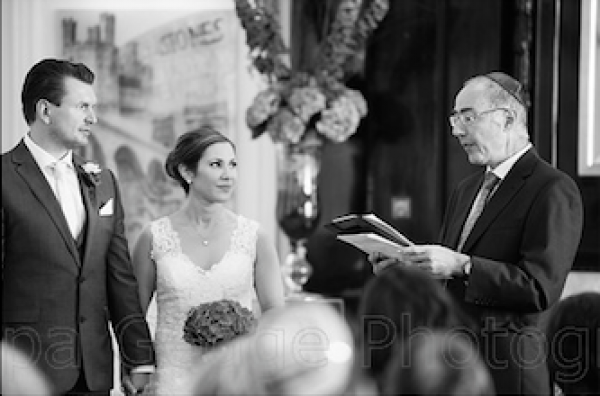
by Michael | May 2, 2023 | Blog
Need I say it, but religion can be the cause of considerable tension, and even worse, among families! I have met many a couple whose relationship has been strained because they’re of different religions.
Because of the potential for conflict, I have heard mixed-faith ceremonies compared to icebergs, with their hidden, submerged dangers!
It needn’t be so threatening.
If one of the couple is religious and the other not so, it normally takes only a little compromise to secure a happy medium. Then the service will possibly contain just a modicum of religion.
If the ceremony is more religious, though, the atheist tends to keep quiet during those bits.
One of the advantages of a civil celebrant-led ceremony is that compromise is possible. I have conducted quite a number that have included the essential element(s) of each religion. That way the couple is satisfied and, often, the whole family is kept happy.
I have had to lead what was a 95% traditional Jewish wedding (under a chuppah) between a practising Jew and a Christian, who was happy attending synagogue, but didn’t want to convert. Rather dauntingly for me, their rabbi attended (but he later congratulated me on the service!).
Another time, I conducted an almost traditional Christian service. I presume the couple had issues with their vicar, but were happy to use me, even knowing that I am not ordained.
Most times, it’ll be a secular, spiritual service with a couple of elements from one religion thrown in. People enjoy the Loving Cup ceremony or treading a glass underfoot, among other rituals.
Pagan can be mixed in with conventional religious elements.
In fact, the choices are very wide.
Obviously, couples need to get together beforehand and decide what is important to them and how they are going to put that into practice. Their celebrant can help with ideas and advice.
It is worth considering the parents (though, ultimately, it is your day and you shouldn’t be bullied into doing what you don’t want to do!) and also the guests. If you are including something obscure, either explain it in a booklet or let the celebrant do so.
Once you have given the matter some thought, it may be a question of a little give-and-take. Hopefully, you will come to a satisfactory conclusion that should be highly successful at all levels.
I’d be happy to have a chat with you about this, and we can navigate together past those icebergs.
Photo: Philippa Gedge
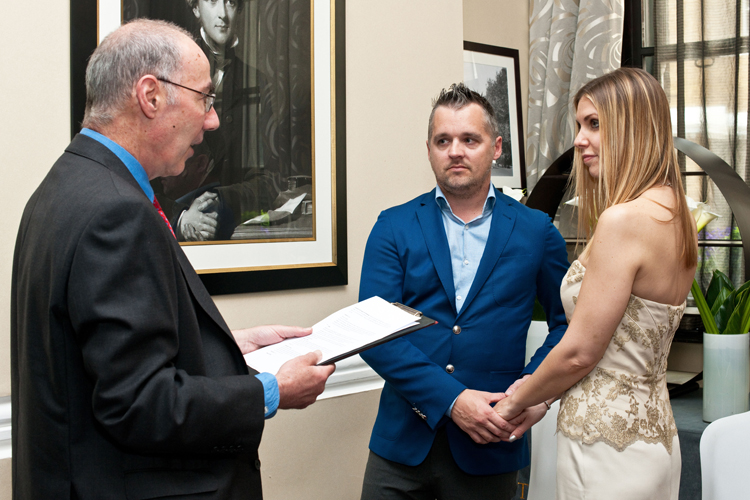
by Michael | Apr 24, 2023 | Blog
I became a civil celebrant over 10 years ago, shortly after meeting my first celebrant. Until that day, I had no idea that such a thing even existed!
So it seems entirely reasonable to me that other people should have little or no idea what a civil celebrant does.
I’d therefore like to explain a few areas of my work and show how they may be of relevance to many people.
Humanist
I’m not a Humanist. Their remit is to lead a wholly secular service. I can do this too, of course, but, as an independent civil celebrant, I can also create and lead a part-religious, mixed-faith or even religious ceremony.
Location and Timing
If you’re not using a celebrant, currently you are limited as to where you hold your ceremony. The full religious one will take place in the church (or wherever); the Register Office one takes place, reasonably enough, at the Register Office (although, depending on certain stipulations being met, also in certain buildings, like some hotels).
In contrast, the celebrant is not restricted – they can hold ceremonies virtually anywhere – indoors, outdoors, in private gardens, up a mountain, in a luxury hotel, on the beach …
The services not led by a civil celebrant normally take place during the day on weekdays and Saturdays. Working evenings or Sundays, however, is quite standard for celebrants.
Ceremony Content
People often ask how much input is mine when it comes to putting together a service. It can vary from ceremony to ceremony (and usually does), but I expect to contribute upwards of 75%, once the client has had a preliminary chat with me.
That chat will give me an idea of the desired tone, of how much (or little) religion is wanted, who might like to participate actively, and which (if any) rituals to include.
My role is to use my experience to give ideas or advice and answer questions. I need to elicit exactly what the client actually wants, and enable them to achieve this.
The process is simple. After the (free) discovery call, once the client has booked with me, I normally email a draft service to them for their approval. They study it at their leisure and let me know what changes they want. Eventually, they will approve every word that I’ll be saying on their big day.
The celebrant-led ceremony is the only one that ensures the client gets a unique, personal ceremony that is perfect for them.
Hopefully, this will have clarified things a lot, but if you have further questions, please feel free to ask me!
photo: Victor Shack
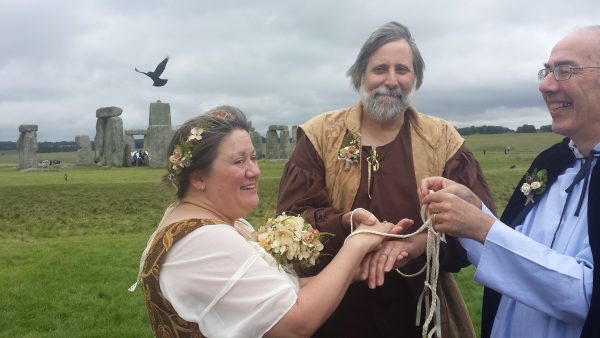
by Michael | Apr 17, 2023 | Blog
The majority of people I come into contact with may have heard of “handfasting”, but don’t know what it is. They certainly don’t know how or why they can be part of a handfasting ceremony, and how it can enhance their event.
History
Its origins are pagan. No, there’s nothing sinister about paganism, by the way. It is nature-related (and nothing and nobody gets harmed!).
The idea of handfastings is medieval. It was a way for peasants (mostly), who were (almost by definition) too poor to afford to hire a clergyman, to be able to afford a marriage rite.
A cord was wrapped round the couple’s wrists until their union was consummated. Then they would keep it as a token of their love and commitment.
Up-to-date versions
As we look at modern times, the symbolism has remained the same. One difference, however, is that there are now essentially two types of handfasting.
One is a small (but significant) part of a wider ceremony; the other is one of the most important elements of an entire service.
It’s up to you how you are bound together. You can use a cord or ribbon, usually at least a metre in length, so it can be tied successfully. It can have several “heads”. Colours can be single or a variety. Choice can be based on personal preference or on what is considered auspicious for the couple. There are different ways to tie the cord/ribbon. I usually prefer an (eternity) figure-of-eight.
A Full Service
Although there is more than one way to put together a full service, you can agree what goes in with your celebrant beforehand.
There is likely to be the following, though:
Sanctifying the Circle
The circle symbolises the womb of Mother Earth and the idea is to make the ceremony site a holy place.
Elemental Blessings
Blessings in the four principal directions – these enable us to appreciate how the four elements help us on our journey.
Loving Cup
The couple may use their favourite drink quaffed from a loving cup (or “quaich”). This symbolises drinking in the promises or vows the couple has made.
The Handfasting
This is the symbolic binding of the hands. We get the terms “tying the knot” and “bonds of holy matrimony” from this. This act may only last a minute.
Jumping the Broom
This is another old custom, which is probably derived from American slave weddings. (For some people, it is therefore somewhat controversial.) It symbolises the creation of a new home together.
What a handfasting can add
The act of handfasting and the words that accompany it can be very beautiful. Moreover, the ritual stands out by its uniqueness and also the interplay and visible reactions of the couple.
The connection to nature is also highly significant.
Whatever the reason for including a handfasting, you are welcome to discuss it with me. Just give me a call.
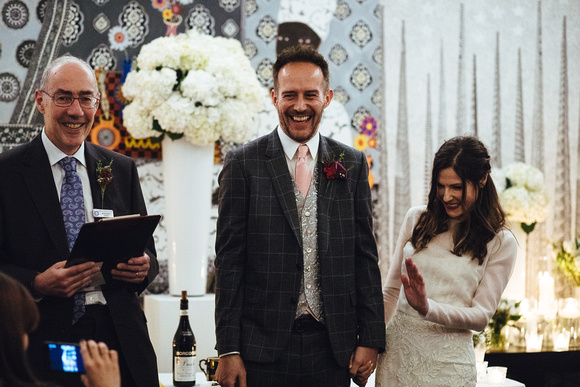
by Michael | Apr 4, 2023 | Blog
A ceremony such as a wedding is major. It comes with stress. You are centre-stage. Its
success matters to you.
You also want to enjoy it, so you need to de-stress.
By the way, I am not saying that a little bit of adrenaline on the day isn’t natural. It’s
even quite beneficial. But it mustn’t be excessive, otherwise it can spoil the occasion for you.
One of the ways you can de-stress is by starting preparations in good time, and forming a
sound support team. That doesn’t just mean well-intentioned family members, but
professional suppliers too.
You and your intended need to be on the same page. You need to agree your budget and decide
on what is indispensable (eg officiant!).
Then you can start getting active. If you can put together a good, professional team, then
that will take the pressure off so much during the run-in and on the big day itself.
Preparation
I urge building a professional team, rather than relying on the goodwill of family and/or
friends. If something does go wrong, it may be beyond the ability or experience
of your family and friends to put it right. A professional may well be able to
sort it out quickly and painlessly.
Moreover, if something does go wrong with an ‘amateur’ ceremony, you may be tempted to blame
the friend or family-member whose mistake or oversight it was. That could be
the end of a long-running friendship.
If you are choosing a team of professionals, do consider personal recommendation (although
bear in mind that not everyone’s tastes and opinions will be the same!). It
usually pays to consult the supplier’s website. Have a look at what they offer
(or do not!) and see the testimonials.
Then make direct contact with them. Preferably, meet them in person (with a list of
questions). See if you like them (which is not to be under-estimated) and
whether they seem to be receptive to your ideas for the ceremony.
If you’re happy with their Ts & Cs, only then worry about their price. It’s worth
paying for peace of mind.
Book your suppliers as early as possible, so they have time to source what they need and
prepare efficiently.
Attitude
With the best will in the world, and even with the best team of professionals around you,
things can go wrong. Although literally anything could actually go amiss, in practice it
rarely does (particularly if you are well-prepared and surrounded by that great
team).
There’s no point cataloguing the possible mishaps that might just befall you. If you are
well-prepared, you have minimised the risks. If something does go wrong, you
also have the professionals around you who can resolve it.
What do you gain by worrying? Apart from putting others on edge, you spoil your own
enjoyment of proceedings, and that’s not the idea, is it?
And sometimes your own attitude will reflect on events and you may seem to manifest what
actually happens.
So, prepare well, rely on your team, and enjoy a de-stressed ceremony.
For a professional take on your ceremony, please have a chat with me.
Photo: www.lyndseygoddard.com
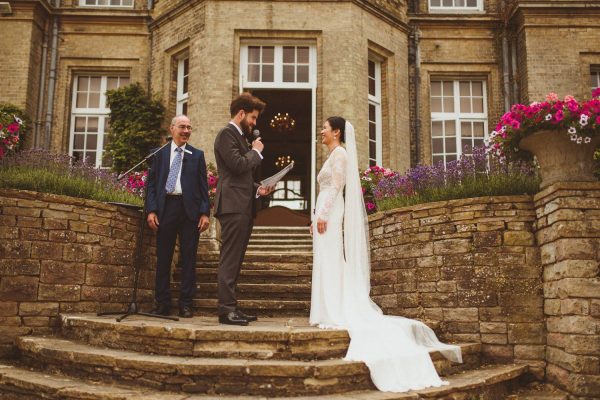
by Michael | Mar 28, 2023 | Blog
Well, of course, you need to define what you consider luxury.
Cons
There aren’t really too many cons, in truth. The bottom line is that you can have a ceremony without a celebrant. If it’s a wedding, you can go down the Church or Register Office routes. They cover everything.
If a ceremony doesn’t need official documentation, technically anybody can conduct the ceremony. So you can ask a friend or relative to do so.
Therefore, technically, using a celebrant is indeed a luxury.
Pros
To despatch the second objection first, if you’re not using a professional celebrant, you may not get the ceremony you are hoping for. It may be difficult to design a suitable service without the guidance and ideas of a celebrant. Moreover, a celebrant knows how to present in public, and will do a lovely job. They will enhance the ceremony.
The first objection is a matter of choice.
You can opt for a religious ceremony (Church). You get the standard service and you know what you’re getting. It won’t be personalised, but that’s fine for some people.
The Register Office service is also standardised. It won’t really be personalised and, in contrast to the religious ceremony, it will be totally secular. You can’t mention God at all, for example. Most Registrars haven’t been trained to present with panache, so the service, which lasts about a quarter of an hour, is rarely particularly special. However, some couples are content with this.
Of course, until such time as the law changes (which should happen this summer), you need to use one of the two above options to comply with the law.
So, in that respect, using a civil celebrant would almost be duplication.
However, the professional services of a celebrant normally include the following:
- The chance to discuss your vision of your ceremony and build a unique service
- Advice and ideas based on (possibly) years of experience
- Respect for your input
- Numerous conversations/emails and drafts to get the order of service just right
- Help with the choreography of a big event
- A trained public speaker
- Professional pride and passion
One of my USPs is that I offer knowledge of languages (French, German, Russian, ability to read Hebrew and Czech), which has proved useful and popular.
Costs
Some celebrants’ package will cost over £1,000. Some will ask half that. (As I write, I’m somewhere in between.)
I would love the chance to make a real difference to your special day.Do contact me for a non-obligation chat.
People who use me are convinced that I am not a luxury!
Evidence
Let me finish with a quote from just one of my happy couples:
“From our first meeting with Michael we came away feeling very confident we would like to use him for our ceremony. His calming yet assertive demeanour put us at ease and we knew he would blend and adapt to what we had planned very well. Michael injected some fantastic ideas along with some beautiful readings and on the day there wasn’t a dry eye in the room. The whole process was very fluid and professional but always with a smile. We couldn’t recommend him enough.”
photo: Matt Penberthy
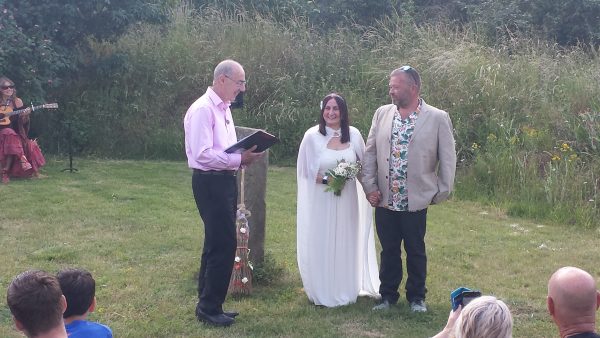
by Michael | Mar 21, 2023 | Blog
There seems to be increasing demand for Vow Renewals. They were popular before COVID (as so many things were), but there are compelling reasons to consider them again.
Timing
Whereas you are welcome to mark a major life event with a Vow Renewal on (or near) the exact date of the anniversary, there is no compulsion to do so. You can actually hold a Vow Renewal when it suits you – even just for the sake of it.
Venue
Another of the beauties of a Vow Renewal is that it can be held wherever you want. There is no compulsion to hold it in a licensed venue or a Register Office or in a church, like a wedding. You are free to be indoors or out, and exercise your imagination, as you please. Your back garden might work, or a local hotel. Equally, a venue that fits in with your passion (on a steam locomotive?!) can be arranged.
I remember a canal-side Vow Renewal, which was most successful.
Demands
There is no legal paperwork involved and there is no obligatory content to the ceremony. The tone can be formal or informal (or something in between). As I have said, the venue and timing are down to you, so you are free to plan (usually together with your civil celebrant) exactly how you want the ceremony and day to run.
Do you want to light a Unity Candle? Do you want family members to participate actively (lighting a candle with you, reading a special text etc.)? Do you want any religious elements? Any prayers?
Excuses!
Why bother with a Vow Renewal at all?
Suggested reasons might include:
- Marking your wedding anniversary, especially if it’s a special year (maybe ending -0 or -5)
- Your circumstances may have changed since your wedding (eg new children or you’ve come through serious ill health)
- You want to welcome step-children into the family
- Your wedding vows have been superseded over time
- You want an excuse to bring friends and relatives together for a celebration
- You may want to proclaim your mutual love publicly (especially if your marriage has come through rocky times)
How to Organise it
As with any major life-cycle event, you discuss it with your other half and, probably, with your civil celebrant. Together, you put together a marvellous ceremony and wonderful day (or night!).
You pick and arrange your venue (and celebrant!), organise the reception, and send out invitations etc. No hassle!
I’d love to play a part in your ceremony. Just call or email me! You’ll be glad you did.






